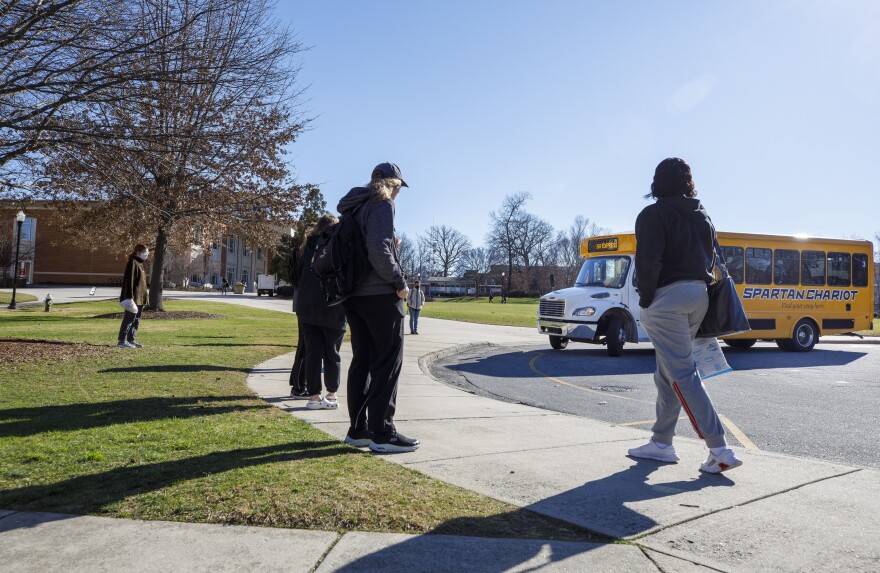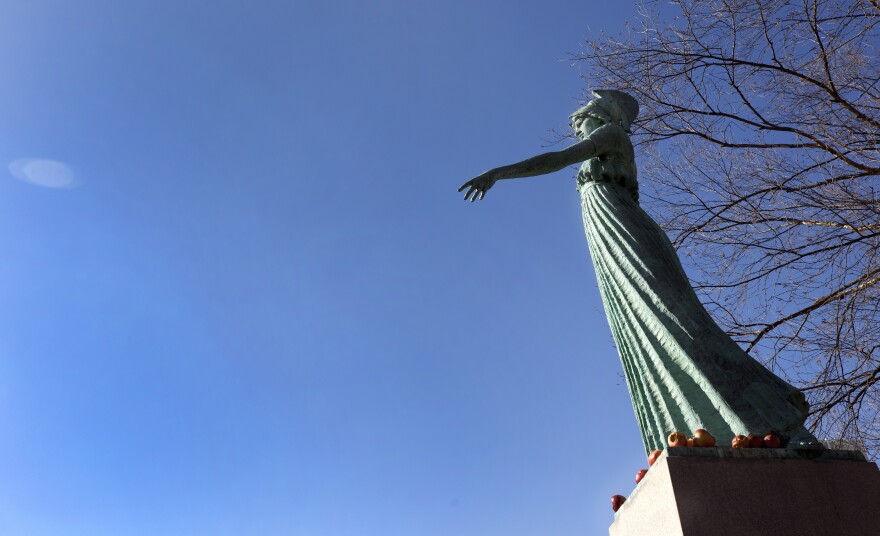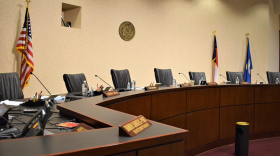As public records requests pour in from right-wing groups seeking syllabi and other course materials, UNC System schools are coming to different conclusions about what is, and is not, a public record.
UNC-Chapel Hill administrators have made it clear that they believe all course materials – from syllabi, to presentation slides, to lecture notes – are faculty's intellectual property and thus protected by copyright. The university refused to fulfill a public records request from The Oversight Project, a spin-off of the conservative think tank The Heritage Foundation, a couple of months ago on these grounds.
Last month, UNC Greensboro attorneys and administrators reached the exact opposite conclusion.
According to multiple professors at UNCG, administrators instructed faculty to hand over their syllabi from the spring 2025 semester to fulfill a recent records request. Charles Bolton is UNCG's faculty senate chair. He said the decision came from UNC Greensboro's university counsel.
"The fact that Chapel Hill took a different position was one of the things that raised questions among faculty here – about why are we doing this?" Bolton said. "I don't know that we have any definitive answer about that."
Through a spokesman, UNC Greensboro’s Vice Chancellor for Institutional Integrity and General Counsel Jerry Blakemore refused to comment or explain the legal reasoning behind the decision to collect faculty syllabi to fulfill public records requests.

Public university systems from Arizona to Texas have intellectual property policies that address ownership of course materials like syllabi. North Carolina, however, has no such policy.
The UNC System considers coursework produced by faculty members as "copyrightable works," but doesn't expand on whether universities must turn over syllabi or other course materials in state or federal public records requests.
WUNC asked the UNC System if it has provided any legal guidance to its public universities on this issue. A spokesperson said the System's open records policy only addresses basic functions and procedures, so it is a "campus level issue."
Faculty leaders at other public universities like NC State and UNC Charlotte told WUNC they have yet to hear from their schools about how they're managing public records requests for course materials. WUNC contacted spokespeople from NC State and UNC Charlotte for comment, but they didn't respond.
Conservative political organizations are increasingly making public records requests for university course materials in Massachusetts, Texas, and other states across the country. Some have made it clear their goal is to prevent instruction associated with diversity, equity, and inclusion or related topics.
Mike Howell is the president of The Oversight Project, the group that filed the public records request for UNC Chapel Hill's course materials. He spoke with WUNC last month shortly after the school denied his request.
"One of the ends will be the public can scrutinize whether their taxpayer dollars are going toward promulgating hard-left, Marxists, racist teachings at public universities," Howell said. "I think there's a lot of people in North Carolina and across the country that would take issue to that."
"Our goal ultimately is to get this garbage out of colleges and universities, not only the government," Howell continued. "And get back to a better society where this ideology isn't affecting every last aspect of it."

Jeff Jones is the head of UNCG's American Association of University Professors (AAUP) chapter. He said plenty of faculty have long made their syllabi public for accreditation requirements or personal reasons. Those same faculty, however, are extremely concerned about an underlying intent behind the groups making the public records requests.
"We're professionals. We've been hired to do our jobs through a very complex vetting and hiring process and we do not need outside groups coming in to interfere with what we do," Jones said. "Nowhere, anywhere, in any profession would that be welcomed. And it's not in ours either."
"The legal aspects of this are a little vague and a little gray, but I can assure you that most of our faculty are not particularly happy with the way this has been handled."
David McKenzie is an intellectual property lawyer who regularly files lawsuits for public records. He also sees the intersection of copyright and public records law as a gray area, because there is not a statute nor a state court opinion on the issue.
"A syllabus is subject to copyright protection, (but) there is a tension with the public records law about whether or not a syllabus alone is subject to disclosure," McKenzie said. "It's something that would qualify for a rather low level of protection; it would be considered a thin copyright. So, you have to sort of balance what the public is entitled to versus what is really belonging to the professor."
"You got to look at why was this created? Is this for the public?" McKenzie continued. "If a public entity has said, like UNC (Chapel Hill) has said, that you get to keep the creative expression, then it does belong clearly with the author."
By default, McKenzie said, thin copyrights for academic works like syllabi lie with the employer and universities can choose whether to pass that ownership on to professors.
This is what allows one school like UNC-Chapel Hill to assert syllabi are the intellectual property of professors and thus not subject to records laws, but another like UNC Greensboro to require the same materials be made available to the public.
McKenzie said the more creative works get, however, the more copyright protections professors have.
"A painting, a book written, or actual course materials – that's going to be subject to a higher degree of protection that belongs to the professor," McKenzie said. "And so, I don't think that because you have a public records law that requires disclosure of things belonging to the public that necessarily is going to extinguish something that belongs to an actual author under the Copyright Act."
Bolton and Jones said they weren't aware of UNC Greensboro administrators asking any professors to submit course materials like presentation slides or lecture notes. But still, faculty are worried about the university turning over even just syllabi.
"Many of us are offended by these outside agitators and groups wanting to come in here to scrutinize our course materials with the goal of imposing an inverted, ideologically driven, Orwellian version of political correctness on us," Jones said. "A lot of people express concern that this is a move to silence and intimidate faculty and interfere with how we do our jobs."
WUNC partners with Open Campus and NC Local on higher education coverage.










